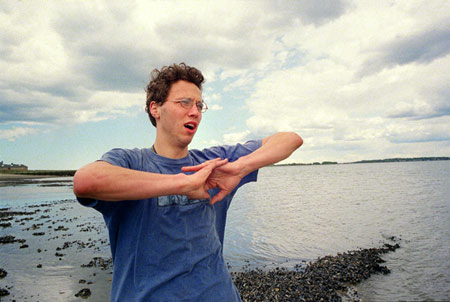‘Gravitating’ toward international public health
Ex-firewalker puts on his traveling shoes

Four years as a Harvard College undergraduate have taken graduating senior Duncan Smith-Rohrberg from believing in mind over matter to pondering matters of the mind.
Smith-Rohrberg, a native of Falmouth, talks blithely about his teenage experiences, first strolling over hot coals as a firewalker and then taking to the ocean every Sunday throughout the winter with members of the Ice Breakers Club he founded in high school.
And he insists the swimming wasn’t just cooling off from the firewalking.
Smith-Rohrberg said his father, who died during his first semester at Harvard, was a big influence on him, getting him involved in the firewalking and cold-weather swimming. Though his father, a psychotherapist, believed in the power of the mind to actually heal – or keep a firewalker from getting burned – Smith-Rohrberg said his own thinking has evolved a bit from that.
While he still thinks the firewalking and winter swims are great community-builders and help people overcome fears, he says physical factors, such as evaporation of perspiration from the feet and a coating of ash over the coals, are what keep people from getting burned.
Smith-Rohrberg said other family members – including his mother, a nurse practitioner and triathlete – also influenced him heavily, showing him the importance of health, creativity, and the people around him.
Though his perspective has changed, Smith-Rohrberg has retained his interest in the mind. He entered Harvard thinking he would concentrate in philosophy, but is leaving with a concentration in cognitive neuroscience, having done some research into mental illness. He plans to attend Yale University Medical School in the fall, in a joint M.D.-Ph.D. program. He said his interests are still evolving, and he’s less inclined to pursue a specialty that focuses on lab work in favor of something that has a more concrete effect.
Smith-Rohrberg says his four years at Harvard have had a big impact on him. Living for the last year at the communal Dudley Coop, where housemates share chores in a less traditional atmosphere than exists in Harvard’s Houses, exposed him to coop residents, many of whom are taking nontraditional paths through Harvard, helping him explore what he wanted from his own life.
A friend, fellow Harvard senior Sheela Maru, provided a sounding board for him to air his ideas about social justice and medicine while the two worked on Project Health’s Well-Fed Well-Read Program, which addressed hunger and nutrition issues in Boston’s Dorchester and Roxbury areas.
Another influence, he said, was his participation in the House and Neighborhood Development Program (HAND), through which he spent three days a week with Herby, a now-10-year-old Haitian immigrant living in North Cambridge. Smith-Rohrberg said they engaged in a variety of activities together, ranging from playing basketball to doing homework, He enjoyed the relationship and enjoyed knowing he had an impact, even a small one, on Herby and his family.
Having an impact looms large in Smith-Rohrberg’s mind these days. In considering his path through medical school, he compares our high standards of health care with the much lower ones in large parts of the world. Rather than work in a lab to push back the frontiers on relatively rare diseases, he said, he’d rather work to extend existing good health practices to the millions who can benefit from them.
“I’ve started gravitating toward international public health, realizing that however fascinating basic science is, the ultimate ends of research is way down the line,” Smith-Rohrberg said. “Currently we have amazing medical technology, we maintain a remarkable standard of health that is totally inaccessible to huge sections of the world …. I think for myself I’d have more satisfaction doing that kind of work.”




